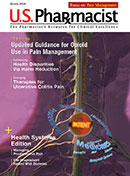Chicago—Despite conventional wisdom, prior exposure to severe acute respiratory syndrome coronavirus 2 (SARS-CoV-2) does not appear to guarantee a high level of antibodies, nor does it assure a robust antibody response to the first vaccine dose, a new study points out.
The report in Scientific Reports goes against the assumption that past COVID-19 infection guarantees immunity to reinfection. Based on the results, Northwestern University researchers advise that two doses of vaccination are necessary for those who have recovered from the virus.
The small study indicates that, 2 months after the second mRNA vaccine, antibody response decreases 20% in adults with prior cases of COVID-19.
“Our study shows that prior exposure to SARS-CoV-2 does not guarantee a high level of antibodies, nor does it guarantee a robust antibody response to the first vaccine dose. For people who had mild or asymptomatic infections, their antibody response to vaccination is essentially the same as it is for people who have not been previously exposed,” said lead author Thomas McDade, PhD.
The study points out that two-dose messenger RNA vaccines (BNT162b2/Pfizer and mRNA-1273/Moderna) against SARS-CoV-2 are highly effective in preventing symptomatic SARS-CoV-2 infection. It adds, however, that the durability of protection, especially with the emergence of viral variants of concern, is not known. There also is a question of whether the response to vaccination may differ based on prior SARS-CoV-2 exposure history.
To investigate protection against SARS-CoV-2 variants, binding, and neutralizing antibody responses following both vaccine doses were measured. Significant declines in antibody levels 3 months postvaccination were documented, as well as reduced neutralization of emerging variants, highlighting the need to identify correlates of clinical protection to inform the timing of and indications for booster vaccination.
Researchers compared vaccine response in 27 study participants (mean age 39.7 years, 51.9% female, 59.3% Pfizer, 40.7% Moderna); included were 13 participants who were seropositive and 14 who were seronegative prior to vaccination. Of the seropositive patients, four had PCR-confirmed COVID-19 infections, while the remaining had asymptomatic cases. Samples were collected after the first dose (mean 18.5 days), and twice after the second dose (20.7 days and 56.3 days), with a total followup of a mean of 95.5 days.
The study team measured SARS-CoV-2 receptor-binding domain (RBD) IgG with a quantitative immunoassay. In addition, a surrogate virus neutralization test (sVNT) was used to measure inhibition of binding to the ACE2 cell receptor in vitro of wild-type (Wuhan) SARS-CoV-2 spike, as well as the following spike variants: B.1.1.7, B.1.351, and P.14.
Results indicate that, overall, the median anti-RBD IgG level increased fivefold after the second vaccine dose in comparison with the first dose (4.2 μg/mL vs. 21.0 μg/mL). The authors determined that median inhibition against wild-type spike was 59.1% after the first dose and 97.7% after the second.
“However, responses were significantly lower to P.1 (27.1% and 70.0%), B.1.351 (34.2% and 66.7%), and B.1.1.7 (45.9% and 92.0%),” they write, adding, “Median anti-RBD IgG concentration dropped 50.1% at three months post-vaccination relative to the expected peak concentration after the second vaccine dose, and IgG after dose 2 predicted IgG at three months. Median inhibition against all the variants was lower at three months, with the largest declines in surrogate neutralization of P.1 (31.2%) and B.1.351 (27.5%), and smaller declines for B.1.1.7 (18.4%) and wild type (12.5%).”
Researchers point out that neutralization against all the variants was higher for PCR-positive cases compared with other seropositive and seronegative participants.
The study concludes, “Three months after first vaccine dose, median anti-RBD IgG was higher for seropositive participants with a PCR confirmed diagnosis of COVID-19 (27.2 µg/mL) in comparison with seronegative participants (8.7 µg/mL), as well as participants who tested seropositive for prior exposure but had asymptomatic infections (8.2 µg/mL). There were no significant differences in levels of surrogate neutralization of spike-ACE2 interaction between pre-vaccination seronegative and seropositive participants (Wilcoxon rank-sum, all comparisons P >.70). Neutralization of all the variants was higher for pre-vaccination PCR positive cases in comparison with pre-vaccination seronegative/seropositive participants.”
“Many people, and many doctors, are assuming that any prior exposure to SARS-CoV-2 will confer immunity to re-infection. Based on this logic, some people with prior exposure don't think they need to get vaccinated. Or if they do get vaccinated, they think that they only need the first dose of the two-dose Pfizer/Moderna vaccines,” Dr. McDade said. “As far as protection goes after vaccination, the story is the same for all the variants, including delta—the vaccine provides good protection, but not as good protection as the original version of the virus for which the vaccine was designed. Combine that with the fact that immunity wanes over time, you get increased vulnerability to breakthrough infection.
“So, it’s two strikes right now—delta plus waning immunity among the first wave of the vaccinated,” he advised.
The content contained in this article is for informational purposes only. The content is not intended to be a substitute for professional advice. Reliance on any information provided in this article is solely at your own risk.





